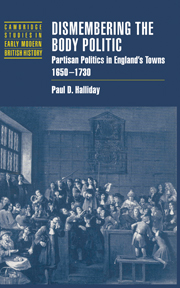Book contents
- Frontmatter
- Contents
- Preface
- List of abbreviations
- Part one Corporate ideal and partisan reality
- 1 The paradox of partisan politics
- 2 “The best of polities”
- 3 From purge to purge: Civil War, Interregnum, and Restoration in the corporations
- 4 Partisan politics, 1663–1682
- Part two The King and his corporations, 1660–1688
- Part three Partisan conflict and the law in a dynamic society
- Appendix A Royal charters of incorporation, 1660–1727
- Appendix B Enforcement of the Corporation Act, 1662–1663
- Select bibliography
- Index
- Titles in the series
1 - The paradox of partisan politics
Published online by Cambridge University Press: 10 November 2009
- Frontmatter
- Contents
- Preface
- List of abbreviations
- Part one Corporate ideal and partisan reality
- 1 The paradox of partisan politics
- 2 “The best of polities”
- 3 From purge to purge: Civil War, Interregnum, and Restoration in the corporations
- 4 Partisan politics, 1663–1682
- Part two The King and his corporations, 1660–1688
- Part three Partisan conflict and the law in a dynamic society
- Appendix A Royal charters of incorporation, 1660–1727
- Appendix B Enforcement of the Corporation Act, 1662–1663
- Select bibliography
- Index
- Titles in the series
Summary
Queen Elizabeth made Preston's governors “one body corporate and political.” Nearly a century later, the divided body struggled to heal itself after two decades of repeated political woundings. The worst strife came in the year or so after the King's return to his kingdom in 1660. Two groups within the corporation competed for local control, each directing at the other the most damaging charges they could contrive. The “honest party” momentarily gained the upper hand and then attempted to restore unity the only way they knew how: they purged their foes. Next, to prevent further dissensions and to tighten their grip on power, those remaining in the corporation made rules.
Debates in all common councils ought still to be had and observed with great moderation, gravity, and modesty, and likewise without the least reflection, or reviling of any person or persons, being members and partners at such consultations, the contrary whereof doth ever occasion great animosities and much distraction amongst the councillors at such public meetings and likewise tendeth much to the great prejudice and disquiet of the weale public.
Following this opening blast against political schism came a detailed code of behavior, made to prevent these “mischiefs and evils.” For they were evils: “party” divided the social body created by God and the corporate body created by the monarch. If heresy were a crime against the lord in heaven, then party was a crime against the lord at Whitehall. Partisanship was the political kin of religious sectarian identity in an age in which such identity meant social and political exclusion as well as damnation.
- Type
- Chapter
- Information
- Dismembering the Body PoliticPartisan Politics in England's Towns, 1650–1730, pp. 3 - 28Publisher: Cambridge University PressPrint publication year: 1998



